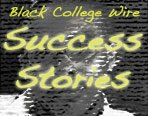| Hip-hop and the Election: What's the Impact? |  |
 |
 |
| By Charles Gee -- Black College Wire | |
|
Click here for video recording. Hip-hop is having an influence on this year’s presidential election, but not all agree that the impact is positive. Artists, managers, media personalities and other prominent members of the hip-hop community participated in a forum at Florida A&M University to discuss the current direction of the genre, its future, and its impact on the presidential election. About 250 students crowded the Perry-Paige auditorium for the "10th Anniversary of Hip-Hop Forum." The topic that garnered the most attention was the upcoming presidential election and its relationship to hip-hop. 
Charles Gee/Black College Wire
Fonzworth Bentley with FAMU students after forum
“I don’t think hip-hop should play a role in this election until Nov. 5th,” Daniels said. “They don’t look at what you say positive, only the negative.” The audience responded with laughter as the confident manager continued his speculation that if hip-hop has any voice from this point forward in the upcoming election that the opposition of the culture would find a way to turn the message negative and use it against Democratic nominee, Barack Obama. Bacon disagreed with Daniels’s theory. “It diminishes the power of hip-hop to remain silent,” the former Def Jam employee said. “We can’t claim to be the most influential culture in music, fashion, media and every other part of our lifestyle and not have anything to do with the most important election of our life.” Panel moderator Fonzworth Bentley, a TV personality and hip-hop artist, used his social status to encourage young eligible voters to take advantage of that right. “I believe that to whom much is given, much is required,” said Bentley, who was on double duty at the university as a moderator and also as a campaigner for presidential candidate Barack Obama. To the surprise of the panel, more than 80 percent of the students raised their hands when Bentley asked how many of the students will be voting for the first time during the upcoming election. Panelist Sean Woods, programming director for WANM-FM, FAMU’s campus radio station, encouraged undecided students to get to know the candidates for themselves. “Don’t vote for someone because of their race or what someone tells you. Check their platforms, look at the news and get to know your candidate,” Woods said. Before the forum concluded, about 20 students got a chance to ask the panelists questions. Questions covered several controversial topics from misogyny to violence. “How do you become successful in a male dominated industry as a woman?” one female student asked. Bacon responded, “It is hard for women, but continue to work hard and don’t fall into the stereotypes of what the industry expects of you.” Bacon further explained that the industry has its fair share of, “bed-hopping.”
The panel was hosted by hip-hop news website Allhiphop.com and featured Sean Woods and Deidra Fields, of FAMU campus radio station WANM-FM; rap group Rock City and their manager, Ray Daniels; Alex Pierre, founder of Lex promotions; Shante Bacon, co-founder of the 135th Street Agency; and moderated by Bentley.
Charles Gee is a broadcast journalism student at Florida A&M University. |
|
| Posted Nov. 02, 2008 |
| < Prev | Next > |
|---|



